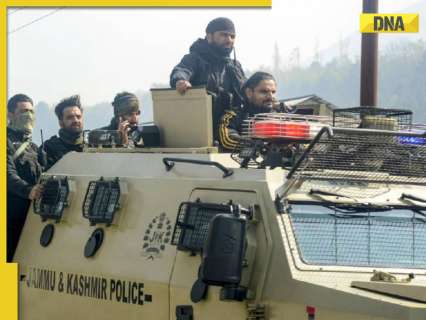
National Investigation Agency (NIA) agents scoured the scene for crucial evidence as army, CRPF, and police units spread out across the hills surrounding the construction area to track down the perpetrators and their accomplices involved in one of the deadliest attacks.
Special Operation Group (SOG) of J&K police personnel during a search operation on Srinagar-Ladakh highway following a terrorist attack, in Ganderbal district, Jammu & Kashmir. (PTI Photo)
Security forces launched a large-scale combing operation in the area adjacent to tourist spot Sonmarg on Monday, a day after a horrific terror attack at a tunnel construction site in Jammu and Kashmir’s Ganderbal claimed seven lives.
National Investigation Agency (NIA) agents scoured the scene for crucial evidence as army, CRPF, and police units spread out across the hills surrounding the construction area to track down the perpetrators and their accomplices involved in one of the deadliest attacks on non-local labourers in the Kashmir valley.
The assailants believed to be Pakistani terrorists, meticulously studied the site layout before executing their plan. They first targeted the labourers’ mess before proceeding to the officers’ quarters.
Officials suspect that the attackers may have had prior knowledge of the site, potentially having worked there previously or receiving support from locals present at the location. Eyewitnesses recounted the cold-blooded firing by the attackers.
The officials said CCTV footage from the area is being scrutinised.
The Resistance Front, a shadow organisation linked to the banned Lashker-e-Taiba, has claimed responsibility for the barbaric act.
In a region that has been plagued by terrorism for over three decades, this area had not experienced such a violent incident before. The attack, which left a doctor and six labourers dead, unfolded when the staff had returned to their camp late in the evening after working on the tunnel project.
The terrorists, two in number, indiscriminately opened fire on the group. Among the deceased were Dr Shahnawaz Dar, Faheem Nasir, Kaleem, Mohammad Hanif, Shashi Abrol, Anil Shukla, and Gurmeet Singh. The NIA’s investigative team visited the site to gather crucial evidence that could aid in identifying the attackers.
As leaders of various political parties and outfits condemned the attack, Jammu and Kashmir Chief Minister Omar Abdullah expressed determination not to let vested interests impede the region’s progress and development.
Lieutenant Governor Manoj Sinha vowed to avenge the brutal attack, holding Pakistan accountable for instigating violence in the area. National Conference president Farooq Abdullah also lashed out at Pakistan, saying Islamabad will have to stop terror incidents here if it wants to have friendly relations with India.
He said there can be no talks between New Delhi and Islamabad till the neighbouring country stops killings in Jammu and Kashmir. “How can there be talks? You kill our innocent people and then you call for talks. First, stop the killings,” Abdullah said.
Meanwhile, sombre scenes unfolded in the Nayidgam area of central Kashmir as thousands came together to bid a final farewell to Dr Shahnawaz Dar. The atmosphere, which was filled with the joy of his daughter’s wedding festivities just a fortnight ago, now resonated with cries of sorrow and lamentation as the community mourned the loss.
The village, situated just a short distance from the ancestral place of banned Hizbul Mujahideen chief Syed Salahuddin, came together to honour the memory of the doctor. Slogans demanding an end to senseless violence echoed through the village, accompanied by cries of “Dar Saheb Zindabad” and calls for a “revolution” in the wake of his sacrifice.
The funeral procession, with the poignant cries of inconsolable women and the grief-stricken faces of the crowd, made its way through the village lanes after which Dar was laid to rest in his ancestral graveyard.
Protests against the killings also erupted in various parts of Kashmir, with demands for justice for the victims and calls to end terrorism. Demonstrations were held in solidarity with the victims, emphasising a united stance against violence and terrorism.
The biggest protest march was held at Pulwama where youth held placards demanding an end to the bloodshed. They also demanded justice for the victims of the terror attack. The protestors were carrying a huge banner that read ‘Pulwama stands against terrorism’.
A similar protest was also held at Ghanta Ghar in Kulgam town. In Jammu, organisations held protests condemning the terror attack and demanding swift action against those responsible, attributing the violence to external forces attempting to disrupt peace and stability in the region.
(Except for the headline, this story has not been edited by DNA staff and is published from PTI)
